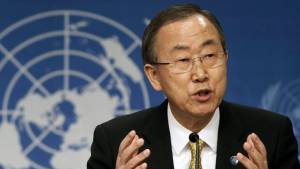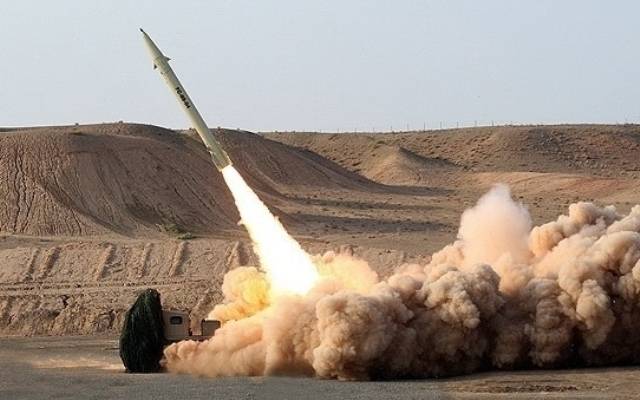
UN Secretary-General Ban Ki-moon (AP/Gary Cameron)
Iran continues to destabilize the Middle East and is constantly working to spread terror throughout the world.
Iran said Saturday it will continue to develop its ballistic missile program, after the United Nation’s (UN) Secretary-General Ban Ki-Moon called on Iran to cease, saying the missile tests aren’t in the spirit of the country’s controversial nuclear deal signed with world powers a year ago.
“Iran will strongly continue its missile program based on its own defense and national security calculations,” foreign ministry spokesman Bahram Ghasemi said in comments published on the ministry’s website.
Iran’s missile program is not linked to the nuclear deal and does not conflict with the UN Security Council resolution endorsing the agreement, he said. “Iran’s missile program has aimed at defense and it is not designed to carry a nuclear warhead,” he added.
However, it is in breach of other UN resolutions.
In the first six-month report to the UN Security Council (UNSC) on the implementation of the resolution on the nuclear deal, the UN chief called on Iran to stop the tests and said they increase tensions in the Mideast.
The resolution, which was adopted last July 20, authorized measures leading to the end of UN sanctions on Iran.
The resolution “calls upon” Iran not to launch any ballistic missiles capable of delivering a nuclear weapon. But when several Iranian test-firings were raised in the Security Council in March, Russia said the launches did not violate the resolution because “a call” is not a demand.
The US, France, Britain and Germany called for the Security Council to discuss “appropriate responses” to Iran’s ballistic missile activity, which they said was “destabilizing and provocative.”
But no action has been taken, and the divisions in the council on whether the ballistic missile launches violated the UN resolution make it unlikely that Iran will face new sanctions.
“While it is for the Security Council to interpret its own resolutions, I am concerned that those ballistic missile launches are not consistent with the constructive spirit demonstrated by the signing” of the Iran nuclear deal, Ban said. “I call upon Iran to refrain from conducting such ballistic missile launches since they have the potential to increase tensions in the region.”
Iran’s nuclear chief Ali Akbar Salehi described the international response as “strange,” adding that “I think a conspiracy is taking shape.”
After the UN nuclear agency certified in mid-January that Iran had met all of its commitments under the nuclear deal, many Western economic sanctions that had been in place for years were lifted, unlocking access to $100 billion in frozen assets and unleashing new opportunities for the country’s battered economy.
Iran is, however, still subject to a UN arms embargo and other restrictions, and the UN resolution includes a provision that would automatically reinstate sanctions if Tehran reneges on its promises.
By: AP and United with Israel Staff
